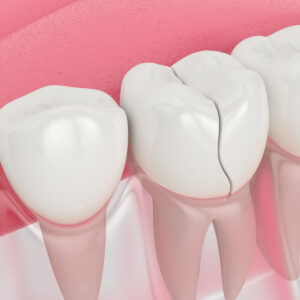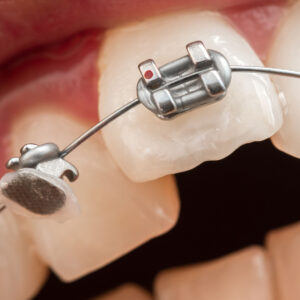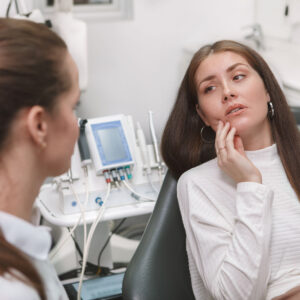Are You Prepared For A Dental Emergency?
Taking regular care of your smile is vital to your oral health and self-esteem. But even patients with the most rigorous dental care routines can’t always prevent dental emergencies. Dental emergencies are characterized as sudden instances of uncontrollable pain, swelling, discomfort, and damage to oral structures that can lead to worsened pain and damage down the road.
If you’re experiencing a dental emergency, it’s crucial to seek prompt treatment to help prevent the pain and damage from worsening. That’s why the dentists at Northbridge Dental, Dr. Galperin and Dr. Sotnikov, offer emergency dentistry services to patients from Alpharetta and Roswell as well as surrounding areas such as Crabapple, Suwanee, and John’s Creek, GA.
What Is Emergency Dentistry?
Emergency dentistry is the prompt treatment of dental emergencies to repair damage, alleviate pain, and prevent further damage as much as possible. For emergency dentistry to be most effective, you should call Northbridge Dental as soon as the emergency begins and set up an appointment with one of our dentists. You can contact our Alpharetta office at (678) 319-0210 or call our Roswell office at (678) 352-9890.
Dental Emergencies & How To Handle Them
Our dentists offer emergency dentistry services 24 hours a day, seven days a week. However, there are certain steps you can take until your visits. By taking prompt action, you can usually increase the likelihood that we can solve the issue to your liking and prevent future issues.
Toothache
- Take over the counter pain medication. If you’re using aspirin, for pain relief, don’t put it directly on the affected tooth or gums. Aspirin is highly acidic so placing aspirin directly on the tooth can result in a serious chemical burn.
- Use cold compresses to control pain and bring down swelling.
- Gently rinse your mouth with a salt solution for thirty seconds. This can help loosen debris that may be caught in cavities or between your teeth, reduce swelling, and improve healing. To make a salt solution, mix one teaspoon of salt in one cup of warm water.
Permanent Tooth Loss
- Pick the tooth up carefully by the crown. Avoid touching any root material that may be attached to the tooth.
- Gently rinse the tooth, but avoid using soaps and cleaners and don’t clean off any root material. Don’t dry the tooth afterward as it needs to stay wet.
- If possible, try to place the tooth back in its socket and bite down on a piece of gauze to prevent the tooth from moving.
- Keep your knocked-out tooth from drying out. Hold it between your cheek and gums, or place it in a glass of milk or saline solution.
- Avoid using tap water to keep the tooth wet, as this can degrade any still attached root material and make reinsertion more difficult.
- Go to the nearest emergency room if you can’t reach one of our offices. The medical professionals there will be able to help you maintain your tooth and heal any oral injuries you may have until you can see one of our dentists.
- Avoid alcohol and tobacco.
Broken or Dislocated Jaw
- If you can’t make it to one of our dental offices, visit the nearest emergency room. They can help address immediate issues such as severe pain and breathing difficulties and can help ensure your jaw stays still to aid healing.
- Don’t try to eat solid foods.
- Avoid facial movements like speaking, smiling, yawning, and chewing as much as possible. This can worsen any injuries and make lasting damage more likely.
- Use cold compresses and pain medication to control pain and swelling.

Cracked Tooth or Bitten Tongue
- Rinse your mouth with a warm salt solution three times a day or after every meal. The saltwater will help eliminate bacteria that seek to enter the injury and cause further damage or infection.
- Avoid chewing in the damaged area.
- Avoid foods and drinks that can irritate and inflame the injury. Common items to avoid include those that are spicy, caffeinated, hot, and alcoholic.
- Continue brushing and flossing to help eliminate bacteria and keep the injury site as clean as possible.
Obstruction Between The Teeth
- Avoid using sharp objects like knives to try and dislodge the obstruction. This can result in serious damage to your teeth and gums.
- Gently floss to remove the obstruction. If the gaps between your teeth are small, use waxed floss as it will be less likely to get stuck. If your gaps are large enough, use unwaxed floss.
- If the obstruction still isn’t coming out and you can’t reach one of our dental offices, you can visit the nearest emergency room.
Lost Fillings or Crowns
- Gently collect any remaining pieces of the crown or filling and place them in a plastic bag. Bring these with you to your appointment.
- Try molding dental wax over the exposed tooth to prevent bacteria from entering. Dental wax can be bought at a dentist office or your local drug store.
- Rinse your mouth with a warm salt solution.
- Avoid foods and drinks that can irritate or damage the exposed tooth. Common items to avoid include those that are crunchy, hard, brittle, and alcoholic.
- Don’t use tobacco products.
 Broken Orthodontics
Broken Orthodontics
- If your aligner trays are broken, don’t wear them.
- If you’re wearing your clear aligner trays when they break, take them out immediately.
- If your braces have a broken wire that’s facing the wrong way or rubbing against the inside of your mouth, gently bend the wire the right way using tweezers or small pliers.
- Use dental wax to cover any sharp or abrasive surfaces and protect the inside of your mouth from dislodged or protruding wires.
- If your dentist gave your prior approval, you can switch to the next set of aligner trays.
Dental Abscesses
-
- Rinse your mouth with a warm salt water solution to control the infection.
- Use a cold compress to reduce inflammation.
- Avoid foods and drinks with high sugar content, as this may be contributing to tooth decay, a common cause of dental abscesses.
- Avoid foods and drinks that can inflame and irritate the infected area including spicy foods, alcoholic drinks, hot and cold foods, crunchy or brittle foods, and foods with small pieces.
- Don’t use tobacco products.
- If you can’t reach our offices at the time of the emergency, visit your nearest emergency room. They can help control the infection by prescribing antibiotics until our dentists can get to the root of the problem.
Preventing A Dental Emergency
When it comes to dental emergencies, the best treatment is still prevention. While it’s not always possible to avoid a dental emergency, here are some steps you can take to help protect your oral health:
- Wear a mouthguard when playing sports. If you don’t have a mouthguard, our dentists can make one for you.
- Practice regular oral hygiene. This includes brushing at least twice a day, flossing at least once a day, preferably before bedtime, and rinsing between meals.
- Avoid tobacco products and limit alcohol. Tobacco and alcohol often inhibit your body’s ability to heal, exacerbating any oral injury you may have or may receive.
- Avoid chewing on hard things and using your teeth to open things.
- Visit Northbridge Dental at our Alpharetta or Roswell office at least once every six months for dental exams.

